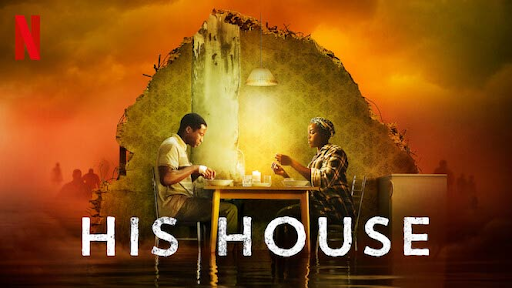His House: Film Review

December 15, 2021
I’ve never been much of a horror connoisseur–I hate being scared with a passion–but my friends are addicted to them. Over the weekend, one of my friends convinced me to watch a horror movie with her despite my usual skepticism. The premise of the movie she chose hooked me, which is the only reason I agreed to give it a chance in the first place.
“Just close your eyes if you’re scared,” she argued. “It’s what I do.”
I was thoroughly perplexed. Why would you want to watch a movie that you know you won’t even truly watch?
Nevertheless, I agreed, and I’m glad I did.
The film was titled His House, and it was about a couple escaping the tribal wars of South Sudan and finding refuge in a haunted English home. At least, the couple thinks the home is haunted. In reality, there aren’t any ghosts or demons living between the walls or hiding behind the doors; rather, the couple’s trauma is what haunts them, thus making the film more of a psychological thriller than straight-up horror.
I think that’s why I enjoyed it so much. After all, it was more of a critique on the immigration process than anything, and it truly highlighted how difficult it is for immigrants to find a good balance between assimilation and retaining their culture. The entire plot surrounds the characters’ internal battle around whether or not they can forget the horrors they left behind or if they can move past their demons.
The true horror of the film doesn’t come from the “demons and ghosts” that are haunting the couple–though they are terrifying–but instead from the grueling process of escaping within an inch of one’s life, only to be met with an unwelcoming environment.
In order to escape their country, the couple must board a boat and make the harrowing journey at night. However, the refugee boats are overturned and countless lives are lost; the couple is one of the few to survive. Once they arrive in England after being rescued, the couple tells the immigration officers that they have lost their daughter, a girl named Nyagak, to the sea when their boat was overturned. Already, the weight of such grief is palpable, a living cloud of darkness that hangs over them.
To the couple’s joy, they are offered a house, one that is much bigger than even the homes of several immigration officers. To them, moving in is an exciting step in their assimilation process, even if there are a lot of strings attached; for example, one condition is that they cannot move out of their assigned home under any condition. Days pass before they discover that an apeth (or, night witch) has followed them from South Sudan. Whether this is a real demon or merely survivor’s guilt, the fear is real.
His House illustrates how the immigration system wants immigrants to forget any attachments to their homelands, that the only way they can be considered “one of the good ones” is to completely conform to the new system. However, complete conformity, as the film evinces, is not the answer. In fact, it makes matters worse.
This film proves that drowning in a sea of guilt is just as treacherous as drowning in a literal sea. For that reason, as proved abundantly by the main characters, we shouldn’t have to sacrifice our culture and our pasts in order to move forward with our lives. Thus, instead of moving past the tide, we must let its current guide us.
I highly recommend His House, even if you’re as terrified of horror as I am. Despite it being a dark film, it sheds a lot of light on real world problems that we as a society continue to face today.




